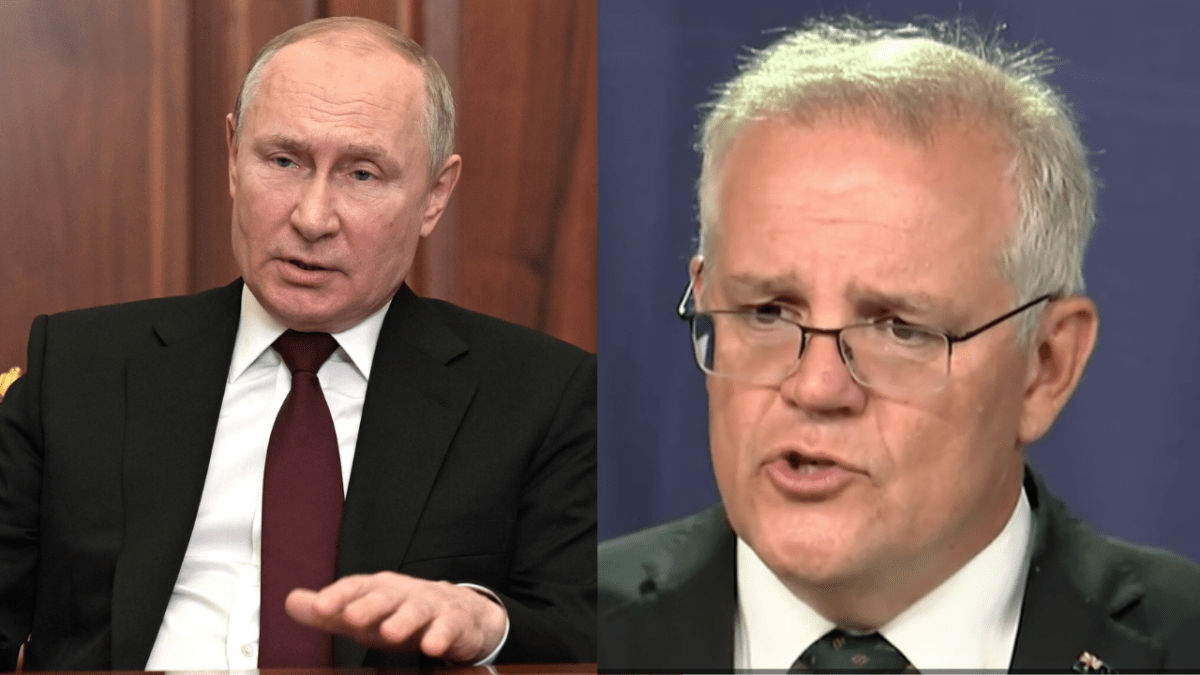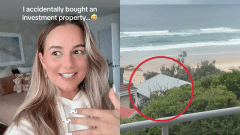
Australia will join other Western nations including the US and the UK and place sanctions on Russia immediately after an emergency national security meeting was called on Wednesday morning. Here’s what that means.
The move comes after Russian President Vladimir Putin ordered troops into contested Ukrainian territory on Tuesday. The Russian government called this a “peacekeeping” effort but Prime Minister Scott Morrison said at a press conference on Wednesday “the invasion of Ukraine has effectively begun.”
Morrison warned we’re in the “last stage before a full invasion”, which could begin within 24 hours because all signs pointed to Russia following through on its threats.
“Australia always stand up to bullies,” Morrison said.
“And we will be standing up to Russia, along with all of our partners and all those who believe that it’s totally unacceptable that Russia could invade its neighbour.”
In response he said the government would amend the Autonomous Sanctions regulation of 2011 to extend existing sanctions that apply to Crimea and Sevastopol (former areas of Ukraine that are now under Russian control) to the Ukrainian regions of Donetsk and Luhansk (where Russia’s troops have entered this week).
“Our intention today and the decisions taken by the National Security Committee will ensure that we are in lockstep with the United States and the United Kingdom in the sanctions that they are imposing upon Russia,” Morrison said.
What is a sanction?
Sanctions are economic punishments enforced by a country or a group of countries against another. It could be bans on travel or the import of goods from that nation, which can have very serious consequences for its citizens.
The idea is that the sanctions will impact the industries and the economy of that country enough that the government is pressured to change. In this case, Russian industries could collapse and the individuals who suffer financially might therefore demand action from their government.
What are Australia’s sanctions on Russia?
Targeted travel bans and financial sanctions will be imposed on individuals in Russia’s national security council and broader sanctions will be extended to Donetsk and Luhansk.
The sanctions will target transport, energy, telecommunications, oil, gas and mineral reserves, as well as several Russian banks.
“These sanctions will significantly expand the scope of persons, and I stress, entities that Australia can list for targeted financial sanctions and travel bans,” Morrison said.
“It’s included to capture persons and entities of what is termed strategic and economic significance to Russia, so that gives us a broad coverage to ensure that we can target those who are particularly involved in these actions and who are aiding and abetting this invasion.
“Our government continues to coordinate closely with the United States, UK and European Union and other governments to ensure there are severe costs to Russia’s aggression.”
Morrison said these sanctions were “consequences for Russia’s actions” as the crisis between Russia and Ukraine and NATO (North Atlantic Treaty Organisation) member states continued to escalate.
“The sanctions that are imposed not just by Australia, but all countries around the world, they will just keep stepping up,” he said.
“It’s important that we play our part in the broader international community to ensure that those who are financing profiting from an autocratic and authoritarian regime that is invading its neighbour should have nowhere to run and nowhere to hide.”
Morrison said Russian leaders were behaving like “thugs and bullies” and flagged further sanctions were possible.
What about Australian citizens in Ukraine?
It is believed 1400 Australians are inside Ukraine and there are around 430 visa applications from Ukrainian citizens to come to Australia.
“At this stage, it is too uncertain to predict how long it will be or what circumstances will be,” Morrison said.
“But we’ll be working in providing support to the Polish government and others who are providing direct assistance to displaced persons where they are being accommodated in those countries.
“We will also be looking at the options for humanitarian support in terms of visa access to Australia.”
The PM said the Australian government was open to offering more Ukranian citizens visas to come to Australia and has instructed the Minister for Immigration to accelerate the conclusion of Ukrainian visa applications to Australia.







